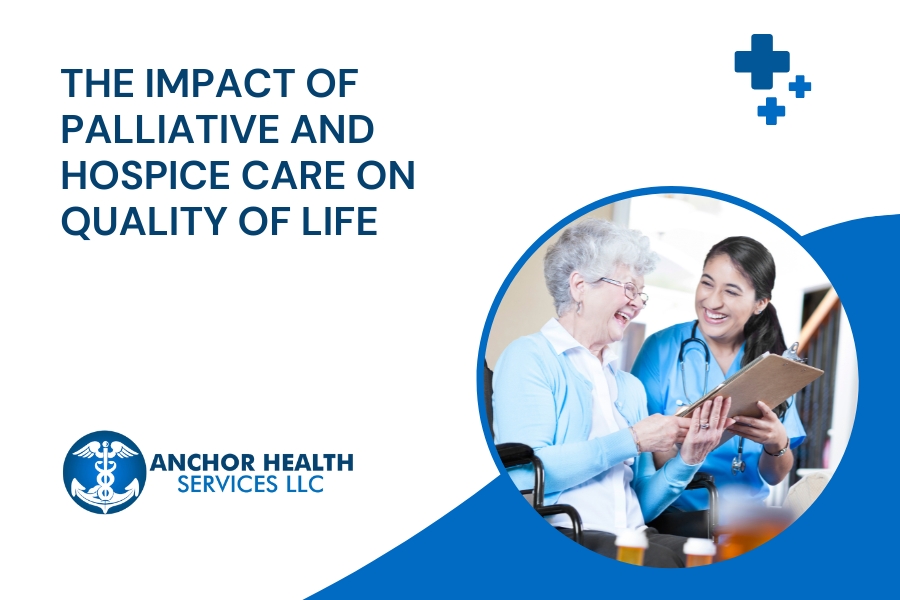Palliative and hospice care play a vital role in improving the quality of life for individuals with serious illnesses or those nearing the end of life. These specialized care services focus on providing comfort, managing pain, and offering emotional support to both patients and their families. By addressing the physical, emotional, and spiritual needs of individuals, palliative and hospice care helps seniors live their final months with dignity, reducing suffering and enhancing comfort.
In this blog, we will explore how palliative and hospice care positively impacts quality of life and the unique benefits these services offer.
Understanding Palliative and Hospice Care
- Palliative Care: This type of care is designed for individuals with serious illnesses, regardless of their prognosis. It aims to relieve pain and other distressing symptoms while improving overall well-being. Palliative care can be provided alongside curative treatments and is focused on enhancing comfort and quality of life.
- Hospice Care: Hospice care is provided when curative treatment is no longer an option, typically when a patient has six months or less to live. The goal of hospice care is to provide comfort, manage symptoms, and offer support to both the patient and their family. Hospice care emphasizes the patient’s wishes and dignity, allowing them to live their final days in peace.
How Palliative and Hospice Care Improves Quality of Life
- Pain and Symptom Management
One of the primary benefits of palliative and hospice care is the effective management of pain and other symptoms. For seniors suffering from serious illnesses, pain can be a significant barrier to enjoying life. Palliative care teams are skilled at addressing pain, whether through medication, physical therapy, or alternative treatments. These teams also help manage other symptoms such as nausea, shortness of breath, or fatigue, allowing patients to remain comfortable.
Hospice care goes a step further by focusing entirely on comfort. When a patient is no longer receiving curative treatment, hospice care ensures that every measure is taken to relieve pain and promote a peaceful environment.
- Emotional and Psychological Support
Coping with a serious illness or nearing the end of life can be emotionally challenging for both patients and their families. Palliative and hospice care provide counseling and emotional support to help individuals navigate these difficult times. Professionals trained in end-of-life care offer guidance and comfort, helping patients come to terms with their diagnosis and supporting their emotional needs.
Care teams also work with family members to help them process grief, fear, and other emotions, providing a holistic approach to care.
- Spiritual Support
For many seniors, spirituality plays an essential role in their end-of-life journey. Palliative and hospice care providers often include spiritual care as part of their services, offering support for patients and families seeking meaning, peace, or closure. This care can involve chaplain services, meditation, or simply providing space for reflection and spiritual exploration.
- Family Support and Guidance
Palliative and hospice care not only focuses on the patient but also provides vital support for their family. Caring for a loved one with a serious illness can be physically and emotionally exhausting. Caregivers often feel overwhelmed by the responsibilities of managing their loved one’s symptoms and navigating the healthcare system.
Palliative care teams assist with creating a care plan and providing medical advice, allowing families to make informed decisions about their loved one’s treatment. Hospice care offers respite for caregivers, giving them time to rest and recharge while knowing their loved one is in professional hands.
- Holistic Care Approach
Both palliative and hospice care take a holistic approach, addressing not just the physical symptoms of illness but also the emotional, social, and spiritual needs of the patient. This comprehensive care helps patients maintain their dignity and comfort during their illness, creating an environment that prioritizes quality of life over quantity of life.
Palliative and hospice care teams include doctors, nurses, social workers, and spiritual counselors, ensuring that every aspect of the patient’s well-being is taken into account. This team-based approach allows for personalized care tailored to the individual’s needs and preferences.
The Role of In-Home Palliative and Hospice Care
For many seniors, receiving palliative or hospice care at home allows them to spend their final days in familiar surroundings, surrounded by loved ones. In-home care provides the same level of professional medical support as a hospital setting but with the added comfort of being at home. Families also benefit from having their loved ones close, allowing for more quality time together.
In-home hospice care services ensure that patients receive round-the-clock attention if needed, with trained professionals available to manage symptoms, provide emotional support, and ensure that the patient remains comfortable.
At Anchor Health Services, we understand the importance of compassionate palliative and hospice care that improves the quality of life for patients and their families. Our experienced team provides comprehensive in-home care, ensuring that your loved ones are treated with dignity and comfort during this difficult time. Contact us today to learn more about our personalized palliative and hospice care services.


